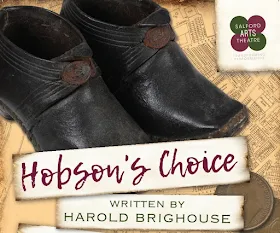Friday 8th June 2018
Salford Arts Theatre
Hobson’s Choice was written by Harold Brighouse in 1916. Set in Salford in the 1880s, the play is about bootmaker Henry Hobson and his three daughters, Maggie, Alice and Vickey. This new production by Salford Theatre Company is on at the
Salford Arts Theatre from 6th to 23rd June.
It’s fairly standard to see reviews of
Hobson’s Choice stating that the play was ‘shocking’ in its day, both for its depiction of female characters and its side-swipe at snobbishness and a rigid class system. Undoubtedly, there are unexpected elements – Maggie’s coercing/bullying Will Mossop into marriage on the grounds of ‘good business sense’, Hobson’s pathetic diatribe on the uppishness of women and the value of the British middle class – but I’m not convinced that these would have been scandalous in 1916.
Maggie Hobson/Mossop is certainly a character who defies feminine stereotypes and behaves in an unconventional way. At 30, she is ‘old’ (a fact that her father points out on a number of occasions), and she rejects romance for sensible business practice. She demands Hobson’s meek boothand Will Mossop marries her, sending away poor Ada Figgins (Will’s erstwhile fiancée) with a flea in her ear, and then effectively puts her own father out of business. But while Maggie doesn’t conform to the stereotype of the polite young lady, she certainly embodies another stereotype – the northern battle-axe.
Hobson’s Choice isn’t so much shocking as it is proper northern. Perhaps Maggie would have been seen as an outrageous character if Brighouse had set his play in that London, but she seems perfectly at home in Salford.
The Salford Theatre Company’s production presents Brighouse’s play ‘as is’, i.e. without any attempt to update the material. Their version is a period piece set in 1880 – as the play was always intended to be (being set over 30 years earlier than it was written). Any attempt to modernize Hobson’s Choice or ‘make it relevant’ would only obscure the play’s comical balance of affectionate nostalgia and modernizing desire.
This balance is struck in the Salford Theatre Company’s production quite simply through staging and performance. The period features are there, but not overdone. The sets feel like 1880, but aren’t meticulous or overdressed. The performances aren’t overstated or mannered.
Stand-out performances are Scott Berry as Henry Hobson and Lyndsay Fielding as Maggie. Inevitably, productions of Hobson’s Choice encourage comparisons with David Lean’s 1954 film version – indeed, I heard people in the bar before the show talking about Lean’s film – but Berry and Fielding offered very different performances to those of Charles Laughton and Brenda de Banzie.
Fielding’s Maggie is believable as a not-quite-old-maid with a good business head on her shoulders. No-nonsense and shrewd, rather than bossy and bitter, this Maggie is easy to root for and more three-dimensional than some other portrayals of the character. It’s quite easy to see why Will Mossop quickly comes round to the idea that she’s the woman for him (making the final scenes with the couple all the more enjoyable).
Berry is excellent as Hobson. He avoids a bombastic, larger-than-life performance in favour of a more personable, sympathetic portrayal. Berry’s Hobson is a small man, shrinking back into his outdated beliefs in an attempt to fight off the inevitable. Even his most well-known speech (on the ‘uppishness’ of women) is deflated – as though he already knows he’s on a losing streak. It’s a relief to know he has a daughter (and son-in-law) who can take care of him at the end.
Of the other performances, Elka Lee-Green and Connie James are enjoyable as Alice and Vickey – keeping up a comical array of facial expressions whenever the other characters were talking. Joseph Walsh is likable as Willie Mossop, handling the transition from hapless boothand to confident small businessman well. The warmth that develops between Will and Maggie is convincing and satisfying.
It’s always nice to watch a production of Hobson’s Choice on its home turf. The local references (like Willie’s lines about the metaphorical distance from Oldfield Road to Chapel Street to St Ann’s Square) still make you smile, and Hobson and his daughters haven’t lost their Salfordian charm.
Hobson’s Choice is on at
Salford Arts Theatre until 23rd June.


